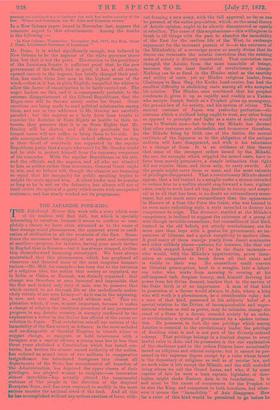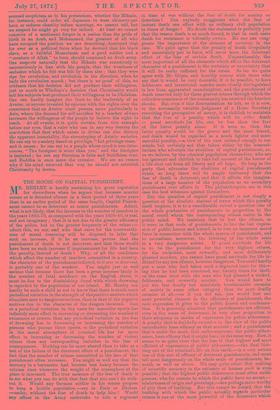THE JAPANESE POPE-KING.
THE Edinburgh Review this week tells a story which none of its readers will find dull, but which is specially interesting to ourselves, because it seems to confirm so com- pletely a theory we have often advanced as to the cause of that strange social phenomenon, the apparent arrest or ossifi- cation of civilisation in all the countries of the East. Some- times the movement has stopped at one point and sometimes at another—progress, for instance, having gone much farther in Bagdad than in Benares —but it has always stopped, civilisa- tion thenceforward becoming stereotyped. We have always maintained that this phenomenon, which has perplexed all observers and daunted some of the most sanguine humani- tarians—Mr. Mill, for example—has been due to the intrusion of a religious idea, the notion that society as organised, say in India, or China, or Burmah, was divinely organised ; that change was therefore at once immoral and impossible, that the first and indeed only duty of man was to preserve that which existed, to act through life on the melodiously melan- choly refrain of our own Litany—" As it was in the beginning, is now, and ever shall be, world without end." This ex- planation which, if true, is most important, because it makes a change of religion the condition precedent of any permanent progress in any Asiatic country, is strongly confirmed by the explanation a writer in the Review has offered of the recent re= volution in Japan. That revolution sets all our notions of the immobility of the East utterly at defiance. In the most secluded and unchangeable of Oriental Empires, in islands where to suggest change, or emigrate, or hold intercourse with a foreigner was a capital offence, a young man has in less than three years abolished a Constitution which has lasted cen- turies, has broken the almost sacred authority of the nobles, has reduced an armed taste of two millions to comparative insignificance, has introduced foreigners into almost all departments of the State, has reconstructed all branches of the Administration, has deprived the upper classes of their privileges, has allowed' women to emigrate—an innovation nlniost incredible-2-has actually altered the immemorial costume of "the people" in the direction of the despised European-drqss,.and:has even ventured to modify in the most serious manner the national creed of the land. And all this he has accomplished without any serious exertion of force, with- out forming a new army, with the full approval, so far as can be guessed, of the entire population, which, on the usual theory of Asiatic opinion, ought to be silently discontented or openly in rebellion. The cause of this acquiescence—this willingness to break in all things with the past, to abandon the immobility of the East for the restless life of the West, to exchange enjoyment for the incessant pursuit of it—is the existence of the Mikadoship, of a sovereign power so nearly divine that its decree can terminate the mental conviction that the existing order of society is divinely constituted. That conviction once changed, the Asiatic, from the most immobile of beings, becomes the one least fearful of revolutionary change. Nothing can be so fixed in the Hindoo mind as the sanctity and utility of caste, yet no Hindoo religious leader, from Chaitanya to Ram Sing, the Kooka head-centre, has had the smallest difficulty in abolishing caste among all who accepted his mission. The Hindoo, once convinced that his prophet condemns it, gives it up as rapidly and readily as a Yankee who accepts Joseph Smith as a Prophet gives up monogamy, the ground-law of his society, and his system of ethics. The ancient costume of Japan was yesterday perfection—the costume which a civilised being ought to wear, any other being as opposed to principle and light as a state of nudity would seem to Western men—but to-day the Mikado has decreed that other costumes are admissible, and to-morrow therefore. the Mikado being by birth one of the deities, the mental certitude of the Japanese as to the obligation of the antique uniform will have disappeared, and with it his reluctance to a change of dress. It is an evidence of this theory that some of the strongest orders issued by the Mikado, the one, for example, which crippled the armed caste, have in form been merely permissive, a simple intimation that right did not require them, and them only, to carry swords. All the people might carry them or none, and the most valuable of privileges disappeared. That a revolutionary Mikado should appear, that a lad trained in a seraglio under a system intended to reduce him to a nullity should step forward a keen, vigilant ruler, ready to work hard all day, hostile to luxury, and scepti- cal as to all that has been, is no doubt an extraordinary occur- rence, but not much more extraordinary than the appearance in Moscow of a Czar like Peter the Great, who was trained in an even more enfeebling style, a style intended to destroy his competence to reign. The Reviewer, startled at the Mikado's competence, is inclined to suggest the existence of a group of wise though invisible counsellors ; but counsellors of that kind, trained in the old beliefs, yet utterly revolutionary, are far more rare than boys with a genius for government, an im- patience of idleness, and a quick receptivity to modern ideas. A. good many of them emerge yearly from Jesuit seminaries and other unlikely places—palaces, for instance, like that out of which stepped Louis XIV. to be the State incarnate— who would, with the Mikado's opportunities, prove them- selves as competent to break down all that exists and is visibly in their way. No counsellors could convert an Oriental prince-priest, bred in a seraglio, into a labori- ous ruler, who works from morning to evening at his self-imposed task, despises luxury, and, himself deriving his power from his divine descent, teaches that in the service of the State birth is of no importance. A man of that kind in possession of a throne would always, in Asia, where a king who will work is a phenomenon, be a considerable ruler; but a man of that kind, possessed in his subjects' belief of a special 'relation to the Divine, of incommunicable and super- natural wisdom as well as power, may do miracles, change the creed of a State by a decree, remodel society by an order, or revolutionise a system of government by a spoken intima- tion. He possesses, in fact, the one privilege which among Asiatics is essential to the revolutionary leader, the privilege of deciding what is and is not part of the divinely-ordered scheme. That privilege belongs in a limited degree to every lawful ruler in Asia, and its possession is the one explanation of the obedience paid to the orders Princes have occasionally issued on religious and ethical subjects; but it cannot be pos- sessed in the supreme degree except by a ruler whose breast is the depositary of religious as well as of secular law, and no such ruler is left except the Mikado, and the still secluded being whom we call the Grand Lama, and who, if by some caprice of fate he were a born captain, legislator, or theo- logian, might shake Eastern Asia to its foundations. It is and must be the rarest of occurrences for the Prophet to be also the King, and competent to both functions, but when- ever it occurs the " immobility " of Asia disappears. How far a ruler of this kind would be permitted to go before he
aroused scepticism as to his pretensions, whether the Mikado, for instance, could order all Japanese to wear chimney-pot hats, or enforce chastity before marriage, we cannot tell, but we suspect he might go very far indeed. At least we cannot conceive of a sentiment deeper in a nation than the pride of birth in an Arab, and Mohammed, the greatest of all who have occupied the position we are describing, destroyed that for ever as a political force when he decreed that his black slave, as a faithful Mussulman and a good soldier and a "creature of Allah " to boot, should command an Arab army. One suspects naturally that the Mikado was consciously or unconsciously in line with his people, that the weariness of seclusion which he felt was felt by them also ; that they were ripe for revolution, and revolution in his direction, when he bade the revolution march ; but there is no proof of this, 'no evidence that his decision did not produce their willingness, just as much as Wladimir's decision that Christianity would suit his subjects best produced their willingness to be Christian. One can hardly imagine the limit to the leadership of an Avatar, or anyone invested by opinion with the rights over the conscience that an Avatar must possess, more particularly in Asia, where the demand for self-sacrifice by a teacher always increases the willingness of the people to believe his right to teach. At all events, it is quite certain, from this example before our eyes, that a ruler who can in any way destroy the conviction that that which exists is divine can also destroy the apparent immobility, the stereotyping of Asiatic societies. He can say to a society based on privilege, "Let privilege cease," and it ceases ; be can say to a people whose creed is non-inter- course, "The foreigner is wiser than you," and the foreigner is imitated ; he can say Sintoism is false and Buddhism true, and Buddha is once more the revealer. We see no reason why if his mind swerved that way he should not establish Christianity by decree.



































 Previous page
Previous page